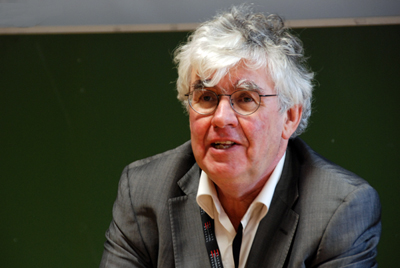How to sell Europe? Dutch journalist Geert Mak was the first to admit that the topic of the roundtable discussion he was leading, was somehow strangely formulated. The objective was rather to show how journalists can make “Europe” a readable and recognizable topic.
Mak kicked off the debate with a tried-but-true cliché: Brussels is not ‘sexy’. “Although it is the hub of European political wheeling and dealing, this is mostly just fun for insiders. What happens in Brussels doesn’t fit the rules of drama and theatre very well, in contrary to the arena of national and regional politics. This makes it extremely hard to write an attractive story about the EU”, says the Dutchman. His verdict is as simple as it is sobering: too many institutions, too few human faces.

So how can you report on the EU in a way that captivates the audience’s attention? “The key lies in connecting what goes on in Brussels with the citizens that are affected by these measures. American journalists are masters at this. They are very good at connecting Washington DC to Joe the Plumber, so to say. In Europe we don’t do this. If we go and talk to people, we interview the factory CEO, not the mechanic. So you constantly have to zoom in and out and go back and forth between Brussels and the effect it has on daily life. But this isn’t a call for more trivial street interviews. No, you have to find interesting people who really have something to say. That way you put a human face to the topic and that is essential to draw the reader in.”
And that’s exactly what Mak set out to do in 1999. On the eve of the new millennium he took off on a one-year-trip through the Old Continent. First there were a series of articles in the Dutch quality newspaper NRC Handelsblad, followed by ‘In Europe’, a book about the turbulent history of 20th-century Europe. ‘In Europe’ immediately became a bestseller in Mak’s native country The Netherlands and on the waves of this success came a 35-episode TV series based on the book, which is currently being aired on Dutch and Flemish television.
Meanwhile the book itself has been translated in fifteen languages, with even a South-Korean version scheduled to appear soon. Mak gives a very simple explanation for this success: “People really are interested in Europe. I noticed that the public is extremely keen for knowledge about Europe. You just have to tell its story in an attractive way.”
No babysitters
In conclusion Mak presented his colleague journalists reporting on European issues with two pieces of advice. “First of all, we have to leave our national trenches and instead start thinking and reporting as Europeans. American correspondents are in that respect the best possible examples. Because they have a natural distance to the EU, the best articles about Europe come from their pen”, says Mak.
“Secondly, we have to leave our political trenches. We, journalists, often get unintentionally involved in the political system we report on. Almost all of us are fascinated by the European experience. So we don’t like to become part of the camp of nationalists or anti-Europeans and therefore are not always as critical as we should be.”
For that reason, Mak made a passionate plea for a more critical approach of EU topics. “Our task is not to sell Europe, but to be as critical as possible. Europe now more than ever needs critical journalists. We are not babysitters, but spies on behalf of our modern-day king, the readers and viewers of our work.”
Posted in | 27.11.2008
By: Yannick Brusselmans



